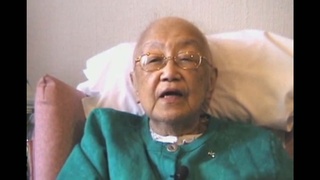Interviews
Japan vs. the United States (Japanese)
(Japanese) In Japan, someone named Lieutenant General Koike asked me, “What do you think about Japan and the United States?” What do I think? In America, the mountains are filled with resources. In Japan, there isn’t anything. Nothing. It’s empty. You can figure it out by that, right? If empty Japan and the US, where the mountains are full, went to war, you know Japan will lose. He said, “Hmmm.” As I expected, Japan finally started the war.
Date: October 14 & 17, 2004
Location: California, US
Interviewer: Eriko Yamamoto
Contributed by: Watase Media Arts Center, Japanese American National Museum.





